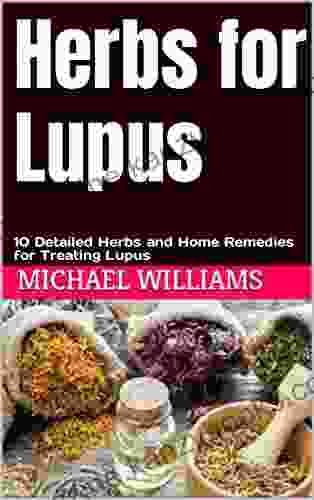10 Detailed Herbs and Home Remedies for Treating Lupus: A Comprehensive Guide

5 out of 5
| Language | : | English |
| File size | : | 1261 KB |
| Text-to-Speech | : | Enabled |
| Screen Reader | : | Supported |
| Enhanced typesetting | : | Enabled |
| Word Wise | : | Enabled |
| Print length | : | 21 pages |
| Lending | : | Enabled |
Lupus is a chronic autoimmune disease that can affect various parts of the body, including the skin, joints, kidneys, and blood. While there is no cure for lupus, a combination of conventional medicine and complementary therapies can help manage symptoms and improve quality of life. Herbs and home remedies have been used for centuries to support the health of people with lupus, and some have shown promising results in modern scientific studies.
In this comprehensive guide, we will explore 10 detailed herbs and home remedies for treating lupus, including their benefits, potential side effects, and how to incorporate them into your daily routine. By empowering yourself with knowledge, you can make informed choices and work with your healthcare provider to develop a personalized treatment plan that meets your unique needs.
1. Boswellia
Boswellia is an extract from the Boswellia serrata tree, which has been used in traditional Ayurvedic medicine for centuries to treat inflammatory conditions. It contains boswellic acids, which have been shown to have anti-inflammatory, antioxidant, and immunomodulatory properties. Studies have found that boswellia may be beneficial in reducing joint pain and swelling in people with lupus.
Recommended dosage: Consult your healthcare provider for the appropriate dosage based on your individual needs.
Potential side effects: Boswellia is generally safe for most people, but may cause stomach upset, diarrhea, and skin rash in some individuals.
2. Turmeric
Turmeric is a spice that has been used in traditional Indian medicine for thousands of years. It contains curcumin, a compound with powerful anti-inflammatory and antioxidant properties. Curcumin has been shown to inhibit the production of inflammatory cytokines and protect against oxidative damage in the body. Studies have found that turmeric may be beneficial in reducing pain, stiffness, and fatigue in people with lupus.
Recommended dosage: 500-1,000 mg of turmeric extract per day.
Potential side effects: Turmeric is generally safe for most people, but may cause stomach upset, nausea, and diarrhea in some individuals.
3. Green Tea
Green tea is made from the leaves of the Camellia sinensis plant and is a rich source of antioxidants, including catechins. Catechins have been shown to have anti-inflammatory, antioxidant, and immunomodulatory properties. Studies have found that green tea may be beneficial in reducing inflammation, improving immune function, and protecting against organ damage in people with lupus.
Recommended dosage: 2-3 cups of green tea per day.
Potential side effects: Green tea contains caffeine, which may cause anxiety, headaches, and sleep disturbances in some individuals.
4. Ginger
Ginger is a root that has been used in traditional herbal medicine for centuries to treat a variety of health conditions. It contains gingerols, which have anti-inflammatory, antioxidant, and anti-nausea properties. Studies have found that ginger may be beneficial in reducing pain, inflammation, and nausea in people with lupus.
Recommended dosage: 1-2 grams of ginger extract per day.
Potential side effects: Ginger is generally safe for most people, but may cause stomach upset and diarrhea in some individuals.
5. Quercetin
Quercetin is a flavonoid that is found in various fruits and vegetables, such as onions, apples, and broccoli. It has anti-inflammatory, antioxidant, and antihistamine properties. Studies have found that quercetin may be beneficial in reducing inflammation, improving immune function, and protecting against organ damage in people with lupus.
Recommended dosage: 500-1,000 mg of quercetin per day.
Potential side effects: Quercetin is generally safe for most people, but may cause stomach upset, headaches, and dizziness in some individuals.
6. Omega-3 Fatty Acids
Omega-3 fatty acids are essential fatty acids that are important for overall health. They have anti-inflammatory and immunomodulatory properties. Studies have found that omega-3 fatty acid supplements may be beneficial in reducing inflammation, improving immune function, and protecting against cardiovascular disease in people with lupus.
Recommended dosage: 1-2 grams of omega-3 fatty acids per day.
Potential side effects: Omega-3 fatty acids are generally safe for most people, but may cause stomach upset, fishy aftertaste, and increased bleeding risk in some individuals.
7. Vitamin D
Vitamin D is an essential nutrient that is important for bone health and immune function. Studies have found that vitamin D deficiency is common in people with lupus and may be associated with increased disease activity. Vitamin D supplements may be beneficial in improving immune function, reducing inflammation, and protecting against bone loss in people with lupus.
Recommended dosage: Consult your healthcare provider for the appropriate dosage based on your individual needs.
Potential side effects: Vitamin D toxicity can occur with excessive supplementation, causing symptoms such as nausea, vomiting, and kidney damage.
8. Acupuncture
Acupuncture is a traditional Chinese medicine technique that involves inserting thin needles into specific points on the body. It is thought to stimulate the release of endorphins, which have pain-relieving effects. Studies have found that acupuncture may be beneficial in reducing pain, inflammation, and fatigue in people with lupus.
Recommended frequency: 1-2 times per week for several weeks.
Potential side effects: Acupuncture is generally safe when performed by a qualified practitioner, but may cause bruising, bleeding, and infection at the insertion site.
9. Yoga
Yoga is a mind-body practice that combines physical postures, breathing exercises, and meditation. It has been shown to have numerous health benefits, including reducing inflammation, improving immune function, and promoting relaxation. Studies have found that yoga may be beneficial in improving symptoms and overall well-being in people
5 out of 5
| Language | : | English |
| File size | : | 1261 KB |
| Text-to-Speech | : | Enabled |
| Screen Reader | : | Supported |
| Enhanced typesetting | : | Enabled |
| Word Wise | : | Enabled |
| Print length | : | 21 pages |
| Lending | : | Enabled |
Do you want to contribute by writing guest posts on this blog?
Please contact us and send us a resume of previous articles that you have written.
 Book
Book Novel
Novel Page
Page Chapter
Chapter Text
Text Story
Story Genre
Genre Reader
Reader Library
Library Paperback
Paperback E-book
E-book Magazine
Magazine Newspaper
Newspaper Paragraph
Paragraph Sentence
Sentence Bookmark
Bookmark Shelf
Shelf Glossary
Glossary Bibliography
Bibliography Foreword
Foreword Preface
Preface Synopsis
Synopsis Annotation
Annotation Footnote
Footnote Manuscript
Manuscript Scroll
Scroll Codex
Codex Tome
Tome Bestseller
Bestseller Classics
Classics Library card
Library card Narrative
Narrative Biography
Biography Autobiography
Autobiography Memoir
Memoir Reference
Reference Encyclopedia
Encyclopedia Martin J Brodie
Martin J Brodie Lother Arsana
Lother Arsana Kevin Mills
Kevin Mills Tracy Dwyer
Tracy Dwyer Sandra Ingerman
Sandra Ingerman Ron Benrey
Ron BenreyM N L
 Kevin Kemp
Kevin Kemp Kim Leatherdale
Kim Leatherdale Philip Chia
Philip Chia Kim Mccosker
Kim Mccosker Shane Ellison
Shane Ellison Phani Raj
Phani Raj Kim Shults
Kim Shults William Seymour
William Seymour Kevin Sands
Kevin Sands Zach Royer
Zach Royer Richard Lombardi
Richard Lombardi Lena Empyema
Lena Empyema Nicole Cozean
Nicole Cozean
Light bulbAdvertise smarter! Our strategic ad space ensures maximum exposure. Reserve your spot today!

 Isaac MitchellUnleash the Culinary Delights of Nature: Discover "The Dutch Oven Camping...
Isaac MitchellUnleash the Culinary Delights of Nature: Discover "The Dutch Oven Camping...
 D'Angelo Carter120 Most Delicious Coconut Oil Recipes: Your Ultimate Guide to Cooking with...
D'Angelo Carter120 Most Delicious Coconut Oil Recipes: Your Ultimate Guide to Cooking with...
 Jerome BlairSimple Guide to Hypercortisolism: Cushing Syndrome Diagnosis, Treatment, and...
Jerome BlairSimple Guide to Hypercortisolism: Cushing Syndrome Diagnosis, Treatment, and... Martin CoxFollow ·16.7k
Martin CoxFollow ·16.7k Caleb LongFollow ·11.9k
Caleb LongFollow ·11.9k Curtis StewartFollow ·12.3k
Curtis StewartFollow ·12.3k Isaac AsimovFollow ·14.5k
Isaac AsimovFollow ·14.5k Danny SimmonsFollow ·13.1k
Danny SimmonsFollow ·13.1k Bo CoxFollow ·10.5k
Bo CoxFollow ·10.5k Jamison CoxFollow ·3.2k
Jamison CoxFollow ·3.2k Gene PowellFollow ·13.6k
Gene PowellFollow ·13.6k

 Ernesto Sabato
Ernesto SabatoLoving Table: Creating Memorable Gatherings
Gatherings...

 Mark Twain
Mark TwainLifestyle After Cancer: The Facts
Cancer is a life-changing...

 Keith Cox
Keith CoxUnlocking the Nutritional Needs of Individuals with...
Individuals with physical disabilities...

 Rubén Darío
Rubén DaríoHandbook And Guide To Evaluation And Treatment
Empowering Healthcare...

 Andy Hayes
Andy HayesUnveiling the Truth: "Garden Myths" by Robert Pavlis...
The world of gardening is often filled with a...
5 out of 5
| Language | : | English |
| File size | : | 1261 KB |
| Text-to-Speech | : | Enabled |
| Screen Reader | : | Supported |
| Enhanced typesetting | : | Enabled |
| Word Wise | : | Enabled |
| Print length | : | 21 pages |
| Lending | : | Enabled |








